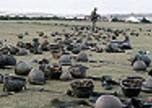Argentine during the 70th decades was consecutively controlled by the military junta administration obtained by the military coup de’tat. The transfer of power from General Jorge Videla to General Roberto Viola, and then taken over by General Leopoldo Galtieri in December 1981, provides not so good image either internationally or domestically in Argentine itself.
It can be stated that commencing from 1976, the popularity of the Argentinean military authoritative government administration has drastically dropped. It is worsened by the decreasing economic condition. The Gross Domestic Product (GDP) fell by 5%, and business investment by 20% over the weakened levels of 1981, and a great number of unemployment accumulates. Such condition is really worrying for a developing country.
The domestic condition of Argentine under the military junta was not free from a resistance. Opposition was conducted by labor groups, united their power under a labor organization “Las Madres de Mayo”, and indicating its closeness to the other opposition leaders and to the group of suppressed people. For them, the government administration of the military junta did not provide a hope to meet the people’s demand for “exploitation abolition” in Falkland Islands and South Georgia from British. For the whole Argentinean people, the Falkland Islands or “Islas Malvinas” always becomes the focus their not yet settled national unity.
The hand-over of sovereignty of Islas Malvinas from British to Argentine becomes one of their national goals. The Government administration of military junta saw the Falklands affair could be used to increase its popularity.
What Galtieri needed was something that would unite the country behind him, take the sting out of the calls for reform and play on the traditional patriotism of the Argentinean people. The ownership of the Falkland Islands had always been an issue in Argentina – a successful taking of the islands would, so Galtieri gambled, unite and rally everyone behind him. So it proved to be.
However, because it was carried out in improper time and unsuitable situation, politically the Argentinean military junta government administration as if were opening a nightmare.
The facts indicated that the Falklands conflict occurred due to the consecutive political miscalculations.The first miscalculation was made by the British Authority in Falklands.The problem was actually fairly simple.
In September 1979, an Argentinean businessman named Constantio Davidoff bought an abattoir for whales in South Georgia from Christian Salvensen, an English businessman from Edinburgh. Davidoff planned to dismantle this abattoir building and sell it in Argentine as scrapped irons. For this purpose, Davidoff conveyed a request to Falkland Governor to obtain the dismantling permit and assistance to use the British ship, HMS Endurance, in order to transport these scrapped irons to Argentine. The request to use the HMS Endurance for such transportation was rejected.
Two years afterwards, Davidoff informed the British officer that he would dismantle and lift the scrapped iron from South Georgia to Argentine by using the Argentinean Naval Ship which was willing to assist him. Davidoff took along with him 41 Argentinean workers and arrived in South Georgia in March 1982, by using the “Bahia Nuen Suceso” belonging to the Argentinean Navy.
Not long after the Argentinean workers arrived in South Georgia, the residents of South Georgia made a protest to the Falkland Governor, because nearby the job site an Argentinean flag was raised. The Falklands Governor sent HMS Endurance to give a warning and to drive out the Argentinean Naval Ship from the said island.
Read More at Other Views of Naval Battles:
Edisi Januari, 2015

















